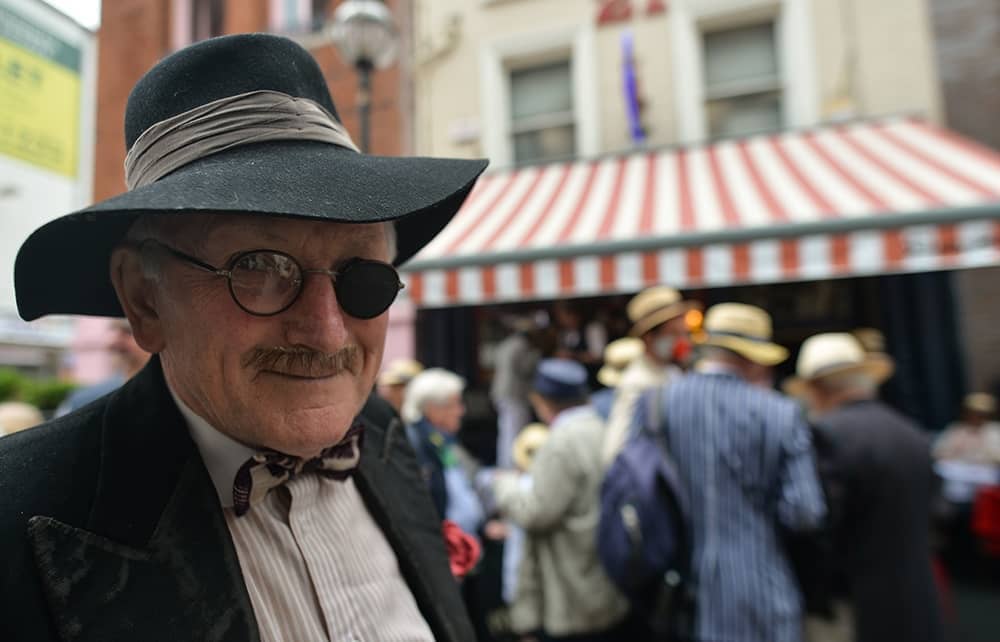I do not think I am alone in confessing that I had read critical works on James Joyce before I got around to reading him. As a schoolboy I drew up my own private curriculum, and one influential book was Malcolm Bradbury’s The Modern World, where I first encountered Joyce; and then moved on to Anthony Burgess’s Here Comes Everybody: An Introduction to James Joyce for the Ordinary Reader. Eventually I did read the actual work. All my teachers told me Ulysses was ‘mucky’. When they said that Finnegans Wake was even muckier, it slightly fritzed my brain when I finally got a copy.
This year being the centenary of the publication of Ulysses, there has been a flurry of new books and republications: the anthology The Book About Everything; Terence Killeen’s extremely useful Ulysses Unbound; Patrick Hastings’s The Guide to James Joyce’s Ulysses and Sam Slote and Marc Mamigonian’s Annotations. But to my mind David Collard’s Multiple Joyce is the most joyful and the most Joycean.
Dublin trams used geometric symbols instead of numbers to help the illiterate navigate the city
The book is, to use a term from Finnegans Wake, a ‘collideorscape’. The initial essay shows its antic disposition. I cannot think of any other book about Joyce’s work that would begin with a discussion of the Monster High toy called ‘Finnegan Wake’, a punk, wheelchair-using merman. Collard’s reaction to discovering such a thing is, understandably, bafflement. The strategy of the book, however, is to take bemusement seriously. Is this plastic gewgaw, like the book itself, ‘a complex, cryptic, multi-layered bundle of signifiers, not all of them comprehensible’?
From there we jump through references to mermaids in Finnegans Wake, Thomas Aquinas on beauty, Roland Barthes on toys and even the bankruptcy of Toys’R’Us (tough luck if you want a Finnegan Wake of your very own). Collard revels in a stream of consciousness that approaches free association, or Rorschach blots. It seems as if nothing cannot be brought back to Joyce, in some esoteric commodius vicus of recirculation. There is a real pleasure in reading a book about Joyce that actually makes you laugh.
Later essays take in subjects as diverse as internet lists, a phoney book purporting to be Oscar Wilde speaking from Purgatory, the redevelopment of Dublin landmarks, pub names, the first Bloomsday celebrations, fights between textual scholars, quizzes, film and radio adaptations and more, and more. I gleaned something from each essay. For example, one is on the Dublin trams that used geometric symbols instead of numbers to help the illiterate navigate the city. There is an obvious connection – cities, signs, Bloom’s meandering thoughts about new tramlines – but I was struck by how closely the symbols reminded me of the sigla that denote the characters in Finnegans Wake. Collard has the generous gift of sending readers down their own textual rabbit holes.
If this were just a gallimaufry of quirky Joyceana it would be entertaining enough. The book does, however, have serious purposes. Firstly, in working through the various critical approaches to Joyce, it draws into focus the disparities. Is Ulysses as chaotic, and sometimes repulsive, as life itself – or, in other words, is it the high-water mark of modernist realism? Or is it intricately structured, profoundly related to previous literatures, and a forerunner of postmodernism? Collard does not adjudicate between the responses but shows how polyvalent Joyce’s texts can be.
Secondly, it faces head-on the accusation of difficulty. Collard does not shrink from saying there are parts that he finds difficult, even with the vast online resources and forums for debate. But, crucially, he does not regard difficulty as a bad thing. In one gloriously sharp aside on the peevish review of Ulysses by Alfred Noyes in 1922 (‘imbecile pages’, ‘the foulest book that ever found its way into print’ and only approved of by ‘pseudo-intellectuals’), Collard writes: ‘The philistine is always confident, always indignant, always confused, seldom interesting…and always, always wrong.’ We need more assertions of the value of literary complexity – he has a good go at Paulo Coelho in this regard – but is clear-sighted that Joyce’s novels have never been popular in the way that J.K. Rowling’s are.
Finally, Collard includes a remarkable section, the 50th, which serves as a fulcrum to the whole book. In it he describes being brought up as a Jehovah’s Witness and the sense of liberation he found reading the sermon section of A Portrait of the Artist as a Young Man. But his background also instils a humility. He has little time for the ‘evangelical cult’ of Finnegans Wake that insists on devotion from its readers to the exclusion of all else. Yet he is able to find lightness, wit, wisdom and ingenuity in his piecemeal dips in and out of it. It brings back to me that epiphanic moment of realising ‘I actually enjoy this’, rather than ‘Aren’t I clever to be up to this challenge?’. The autobiographical section reminds us that as well as being clever and dazzling, Joyce – with the apparition of Bloom’s dead son in the ‘Circe’ episode, or Molly’s night-time soliloquy or Anna Livia Plurabelle’s dissolution into waking –is a profoundly moving writer.






Comments